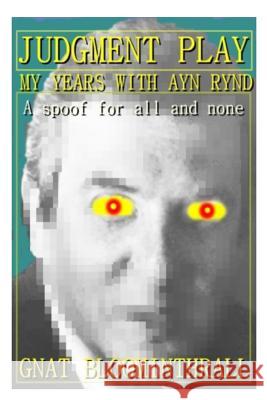Judgment Play: My Years With Ayn Rynd » książka
Judgment Play: My Years With Ayn Rynd
ISBN-13: 9781496006332 / Angielski / Miękka / 2014 / 50 str.
This little book of 16,000 words or so was conceived in response to Nathaniel Branden's 1989 memoir Judgment Day: My Years With Ayn Rand. Branden's compelling blend of pomposity, indelicacy, and bitter swipes at former associates seemed ripe for parody. After I had gotten about halfway through my retelling of the memoir's epic events, I set the effort aside for a little while. Next thing I knew it was a quarter century later, 2014. Among other depressing features of the annum, the socialist Obamacare had arrived and the flying antigrav cars had not. One excuse for not finishing my manuscript had come in 1999 with the publication of the second, revised, cleansed edition of Branden's memoir, entitled simply My Years With Ayn Rand. I gather that this version deletes much of the vindictiveness and perhaps other indiscretions of the original, making Judgment Play even more pointless than before unless one enjoys this sort of thing and has access to library systems and second-hand books or vaguely remembers a book read 25 years ago. So perhaps I should have just let my manuscript molder in my computer. However, I kind of like it myself; and this being the age of the Internet and e-books, which are even groovier than flying antigrav cars, it is easier than ever to inflict dubious reading matter on the public. So here we are. If, despite the hurdles, readers show enough interest in what follows, I shall proceed to Part Two, which I would expect to fashion even faster than Harlan Ellison churned out The Last Dangerous Visions. * * * ON THE night that Ayn Rynd died at the age of 77-March 6, 1982-I was in my Southern Californian mansion sipping wine and munching grapes when my sister called to tell me what had happened. I listened, thanked her, and hung up the phone, gripped by a hairball of emotions that was sweeping through me like a scythe through an Amish corn field. I felt giddy, lighthearted, somber, sad, exhilarated, joyous, bitter, pompous, bored, and sleepy, in that order. It did not surprise me. The complex, contradictory feelings possible to the human mind when dealing with loss were old news to me. I had experienced it all before-a few hours before, in fact, when I had heard about Belushi. I plucked another grape and chewed it meditatively. The phone call was to be the first of many. On a night like this one I was bound to receive more than my usual quota of evening telephone calls. The fact did not surprise me. For as a result of my investigations into psychology, I knew how the human psyche is likely to impel one to lift that handset during times of crisis. I introduce the concept to my clients as Being Through Calling. I also knew that it would be impossible to predict the exact sequence in which the calls would come. And yet, I never doubted that causality governed the universe. Lo and behold my first wife, Babs, who had shared so much of the pain and the joy of our tumultuous and dramatic (and how ) years with Ayn Rynd, was on the line. It did not surprise me. Babs was one of the people who would naturally give me a ring on a night like this. When I heard her voice I felt confirmed and validated in my intuition, as well as a little annoyed. Had I heard the news? she wanted to know. "Yes, yes, I heard," I snapped. Of course I had heard Why would I not have heard? Such a question Once again I was flabbergasted by the extent of the woman's Bambi-like naivete. Did she really suppose that the knowledge of Ayn's death could have been kept from me? Babs was droning on and on about the sadness of the event, how it was the end of an era and so forth. She seemed to want to re-establish the intimate personal context of yore. And while I, too, in some minimal extent, wished to regain a thread of the connection which Babs and I had once shared-there was too much static on the line....
Zawartość książki może nie spełniać oczekiwań – reklamacje nie obejmują treści, która mogła nie być redakcyjnie ani merytorycznie opracowana.











